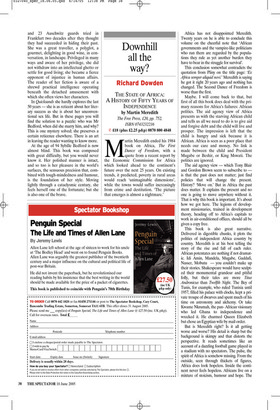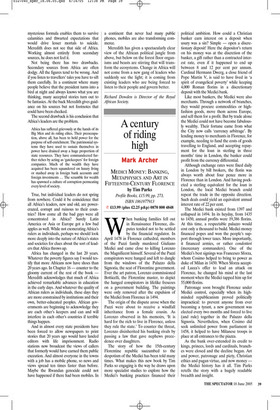Downhill all the way?
Richard Dowden
THE STATE OF AFRICA: A HISTORY OF FIFTY YEARS OF INDEPENDENCE by Martin Meredith The Free Press, £20, pp. 752, ISBN 0743232216 ✆ £18 (plus £2.25 p&p) 0870 800 4848 Martin Meredith ended his 1984 book on Africa, The First Dance of Freedom, with a quote from a recent report by the Economic Commission for Africa which looked ahead to the continent’s future over the next 25 years. On existing trends, it predicted, poverty in rural areas would reach ‘unimaginable dimensions’, while the towns would suffer increasingly from crime and destitution. ‘The picture that emerges is almost a nightmare.’ Africa has not disappointed Meredith. Twenty years on he is able to conclude this volume on the cheerful note that ‘African governments and the vampire-like politicians who run them are regarded by the populations they rule as yet another burden they have to bear in the struggle for survival’.
This conclusion somewhat contradicts the quotation from Pliny on the title page: ‘Ex Africa semper aliquid novi.’ Meredith is saying he got it right 20 years ago and nothing has changed. The Second Dance of Freedom is worse than the first.
Maybe. I will come back to that, but first of all this book does deal with the primary reasons for Africa’s failures: African politics. The aid agency view of Africa presents us with the starving African child and tells us all we need to do is to give aid and forgive debt and the child will live and prosper. The impression is left that the child is hungry and sick because it is African. Africa is seen as a poor place that needs our care and money. No link is made between the child and President Mugabe or Beshir, or King Mswati. The politics are ignored.
The aid agency view — which Tony Blair and Gordon Brown seem to subscribe to is that the past does not matter; just find policies that will change the present. History? ‘Move on.’ But in Africa the past does matter. It explains the present and no one is going to move anywhere without it. That is why this book is important. It’s about how we got here. The legions of development missionaries, trained in development theory, heading off to Africa’s capitals to work in air-conditioned offices, should all be given a copy free.
This book is also great narrative. Delivered in digestible chunks, it plots the politics of independent Africa country by country. Meredith is at his best telling the story of the rise and fall of each ruler. African potentates are nothing if not dramatic. Idi Amin, Mandela, Mugabe, Gaddafi, Nasser, Mobutu — you couldn’t make up their stories. Shakespeare would have sculpted their monumental grandeur and pitiful folly, but their tales are more Titus Andronicus than Twelfth Night. The Bey of Tunis, for example, who ruled Tunisia until 1957, filled his palace with clocks, kept a private troupe of dwarves and spent much of his time on astronomy and alchemy. Or take Kwame Nkrumah, the panAfrican visionary who led Ghana to independence and wrecked it. He charmed Queen Elizabeth but chose an Egyptian wife by mail order.
But is Meredith right? Is it all getting worse and worse? His detail is sharp but the background is skimpy and that distorts the perspective. It reads sometimes like an account of a dazzling football game played in a stadium with no spectators. The pulse, the spirit of Africa is somehow missing. From the outside, seen through thickets of figures, Africa does look hopeless. Inside the continent never feels hopeless. Africans live on a mixture of stoicism, humour and hope. The mysterious formula enables them to survive calamities and thwarted expectations that would drive lesser mortals to suicide. Meredith does not see that side of Africa. Working almost entirely from secondary sources, he does not feel it.
Not being there has two drawbacks. Secondary sources from Africa are often dodgy. All the figures tend to be wrong. And if you listen to travellers’ tales you have to sift them carefully. In a continent where many people believe that the president turns into a bird at night and always knows what you are thinking, many accepted stories turn out to be fantasies. At the back Meredith gives guidance on his sources but not footnotes that could have been checked.
The second drawback is his conclusion that Africa’s leaders are the problem.
Africa has suffered grievously at the hands of its Big Men and its ruling elites. Their preoccupation, above all, has been to hold power for the purpose of self-enrichment. The patrimonial systems they have used to sustain themselves in power have drained away a huge proportion of state resources. They have commandeered further riches by acting as ‘gatekeepers’ for foreign companies. Much of the wealth they have acquired has been squandered on luxury living or stashed away in foreign bank accounts and foreign investments ... The scramble for wealth has spawned a culture of corruption permeating every level of society.
True, but individual leaders do not spring from nowhere. Could it be coincidence that all Africa’s leaders, new and old, are powercrazed, corrupt and ruinous to their countries? How come all the bad guys were all concentrated in Africa? Surely Latin America or Asia or Europe got a few bad apples as well. While not exonerating Africa’s rulers as individuals, perhaps we should look more deeply into the nature of Africa’s states and societies for clues about the sort of leaders that Africa throws up.
Africa has changed in the last 20 years. Whatever the poverty figures say I would testify that more Africans now have shoes than 20 years ago. In Chapter 16 — counter to the gloomy current of the rest of the book Meredith acknowledges that much of Africa achieved remarkable advances in education in the early days. And whatever the quality of African rulers as individuals, these days they are more constrained by institutions and their own, better-educated peoples. African governments are beginning to acknowledge they are each other’s keepers and can and will interfere in each other’s countries if terrible things happen.
And in almost every state presidents have been forced to allow newspapers to print stories that 20 years ago would have landed editors with life imprisonment. Radio stations now broadcast the views of callers that formerly would have earned them public execution. And almost everyone in the towns with a job has a mobile phone, so news and views spread ten times faster than before. Maybe the Rwandan genocide could not have happened if there had been mobiles. In a continent that never had many public phones, mobiles are also transforming commerce.
Meredith has given a spectacularly clear view of the African political jungle from above, but below on the forest floor organisms and beasts are stirring that will transform the ecosystems. Change in Africa will not come from a new gang of leaders who suddenly see the light; it is coming from existing leaders who are being forced to listen to their people and govern better.

















































 Previous page
Previous page